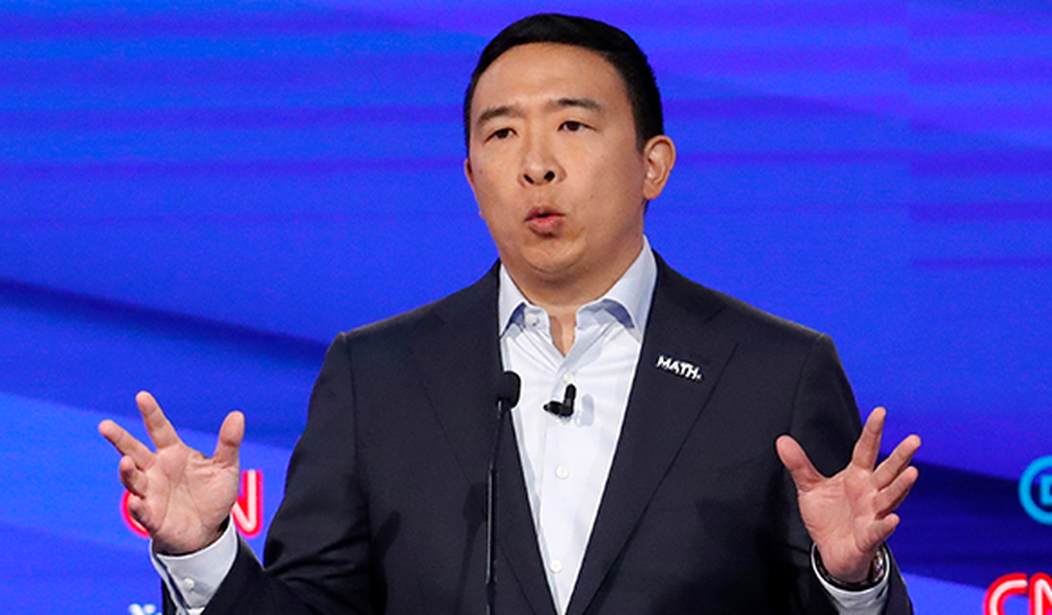Americans were “treated” to yet another excruciating round of #DemDebates on Tuesday. Lower-tier candidates had no qualms showcasing how desperate they are to lead the pack, criticizing frontrunners like Sen. Elizabeth Warren (D-Mass.) for having ideas…not too different than their own. For example, Sen. Kamala Harris (D-Ca.), South Bend, Indiana Mayor Peter Buttigieg, and Andrew Yang each have their own gimmicky big-government proposals. But, for all the different specifics, there’s one common theme: pain and suffering for taxpayers. The candidates can conjure up all the statistical pyrotechnics that they want, but at the end of the day, working-class Americans will feel the pinch for any new or expanded entitlements. The candidates should stay away from costly promises they can’t keep and focus on real relief for working families.
Hitting back against Sen. Sanders’ (I-Vt.) proposed jobs guarantee, former tech executive (and current internet meme) Andrew Yang offered a simple, yet profound insight: “The fact is most Americans do not want to work for the federal government.” This is certainly true in a narrow sense, as few Americans want to resign themselves to the doldrums of federal paper-pushing. But hundreds of millions of taxpayers work for the federal government without the employee badge by paying large shares of their income each and every year to an expanding bureaucracy.
Tax reform was a huge step in the right direction, delivering thousands of dollars of tax relief to more than nine in 10 households. But, Americans still spend 8 billion hours and $360 billion per year just to comply with an out-of-control tax code. Yet like the other Democratic candidates on the stage last night, Yang would vastly increase taxes on working Americans to finance his guaranteed income scheme. Yang would introduce a 10 percent federal value-added tax which would raise the prices of millions of goods across the country. These taxes are known to hit poorest residents the hardest, since low-income households typically spend the largest percentage of their incomes on household necessities. Sure, Yang claims that everyday items would be exempt from his tax, but unelected, out-of-touch bureaucrats will likely make the final call as to what constitutes a “necessity.” European nations typically have these taxes, and by all accounts, their working classes pay far more in taxes than their American counterparts.
Recommended
At least Yang is honest in “asking” ordinary Americans to foot the bill for his proposed entitlement. Candidates such as Sen. Sanders promise free college tuition, Medicare-for-All, and everything else under the sun while proposing to bilk the wealthy. It’s easy to invoke the past (specifically the 1950s) to justify sky-high top tax rates, but candidates leave out critical details in pushing their “progressive” visions. As a percent of economic output, individual income tax revenue was actually lower in the ‘50s when America had 90-plus percent tax rates. Revenues went up a decade later, amidst the prosperity of the 1960s. But that was only after President Kennedy slashed the top tax rate from 91 percent to 70 percent.
That’s right: President Kennedy was a supply-side hero before it was uncool with Democrats. Taking a long, hard look at the data, it appears that tax revenue has more to do with economic growth than the highest rate on the IRS’s table.
Unless one of these Democratic candidates is able to engineer another decade of economic growth after massively hiking taxes (spoiler alert: very unlikely), revenues are unlikely to increase as debt spirals out of control. At that point, taxes on everybody would have to go up, harming Americans already juggling multiple bills. But there’s an alternative to this tired old tax-and-spend theology.
Maybe, just maybe, the presidential hopefuls could turn their attention toward curbing rampant government waste across agencies. For starters, there’s more than $140 billion in improper payments mainly from mammoth programs such as Medicare and Medicaid. Figuring out how to make these programs work better, instead of creating sprawling new programs, seems like a saner approach to making Americans’ lives easier. With more stringent safeguards on government spending, tax bills could decrease even further, driving prosperity to new heights. These are the debate ideas and conversations that Americans deserve, not higher taxes and lower-quality services.

























Join the conversation as a VIP Member